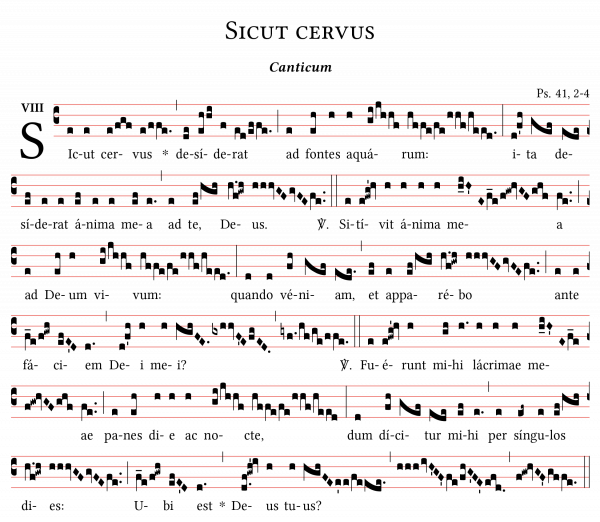Differenze tra le versioni di "Sicut cervus (Canticum)"
(→Video) |
|||
| (5 versioni intermedie di uno stesso utente non sono mostrate) | |||
| Riga 1: | Riga 1: | ||
| + | <!-- Donazione --> | ||
| + | <center> | ||
| + | {| style="margin: 1em 0 0; border: 1px solid gray; padding: 2px; background: #ff0000;" | ||
| + | | style="width: 50%; padding: 0 1em; background: #ff0000; vertical-align: top;" | | ||
| + | <!--colonna sinistra--> | ||
| + | |||
| + | <big><p style="text-align:center">[[Donazioni|<span style="color:#000000"><b>VUOI LASCIARE UNA PICCOLA DONAZIONE?</b></span>]]</p></big> | ||
| + | |}</center><!-- Fine Donazione --> | ||
[[Categoria:Varie]] | [[Categoria:Varie]] | ||
| Riga 10: | Riga 18: | ||
''ad fontes aquarum:''<br /> | ''ad fontes aquarum:''<br /> | ||
''ita desiderat anima mea ad te, Deus!''<br /> | ''ita desiderat anima mea ad te, Deus!''<br /> | ||
| + | |||
| + | ''Sitivit anima mea ad Deum vivum:''<br /> | ||
| + | ''quando veniam, et apparebo ante faciem Dei mei?''<br /> | ||
| + | |||
| + | ''Fuerunt mihi lacrimae meae panes die ac nocte,''<br /> | ||
| + | ''dum dicitur mihi per singulos dies: Ubi est Deus tuus?''<br /> | ||
|valign=top| | |valign=top| | ||
; '''Traduzione in lingua italiana''' | ; '''Traduzione in lingua italiana''' | ||
| − | + | Come la cerva anela<br /> | |
| + | ai corsi d’acqua,<br /> | ||
| + | così l’anima mia anela a te, o Dio.<br /> | ||
| + | |||
| + | L’anima mia ha sete di Dio, del Dio vivente:<br /> | ||
| + | quando verrò e vedrò il volto di Dio?<br /> | ||
| + | Le lacrime sono il mio pane giorno e notte,<br /> | ||
| + | mentre mi dicono sempre: Dov’è il tuo Dio?<br /> | ||
|} | |} | ||
| + | |||
== Spartiti musicali == | == Spartiti musicali == | ||
Spartito gregoriano, impaginato su foglio formato A4: | Spartito gregoriano, impaginato su foglio formato A4: | ||
| − | [[File: | + | [[File:Sicut-cervus-canticum.png|600px]] |
| − | Spartito disponibile in formato PDF impaginato su foglio A4, [[Media: | + | Spartito disponibile in formato PDF impaginato su foglio A4, [[Media:Sicut-cervus-canticum.pdf]] |
== Video == | == Video == | ||
| Riga 30: | Riga 52: | ||
== Codice sorgente GABC == | == Codice sorgente GABC == | ||
<pre> | <pre> | ||
| − | + | name:Sicut cervus; | |
| + | office-part:Canticum; | ||
| + | mode:8; | ||
| + | book:Graduale Romanum, 1961, p. 239I; | ||
| + | transcriber:Andrew Hinkley; | ||
| + | %% | ||
| + | (c3) SIc(e)ut(e) cer(e/fgf)vus(e/ffe.) *(,) de(de)sí(ehhi)de(f)rat(ed/effe.) (;) ad(e) fon(eh)tes(h) a(h)quá(gi/jhhf)rum:(hffe/fe/hhf/heed.) (:) i(d!f'h)ta(gef) de(ede)sí(ef)de(e)rat(e) á(ef)ni(e)ma(e) me(ef)a(e.) (,) ad(e) te,(ef/hgh) De(h.f!gwh)us.(hhhvGF/gvFE/fe..) <sp>V/</sp>.(::) Si(e)tí(e!fwg'!hv)vit(h) á(h)ni(h)ma(h) me(h_iH'E/f_e/f!gw!hvGF/ghf)a(fe..) (;) ad(e) De(eh)um(h) vi(gi/jhhf)vum:(hffe/fe/hhf/heed.) (:) quan(d)do(d) vé(fh)ni(gef)am,(ede.) (,) et(ef) ap(e)pa(ef/hgh)ré(h.f!gwh)bo(hhhvGF/gvFE/fe..) (;) an(e)te(e) fá(f_e/f!gwh)ci(efE'D)em(d.) (,) De(d!f'h)i(h) me(h)i?(hghFE.gxhhvF'E/fgED.) (,) (gyf./hf/ge/ffe.) <sp>V/</sp>.(::) Fu(e)é(e!fwg'!hv)runt(h) mi(gh)hi(h.) lá(h)cri(h)mae(h) me(h_iH'E/f_e/f!gw!hvGF/ghf)ae(fe..) (;) pa(e)nes(eh) di(h)e(h) ac(h) no(gi/jhhf)cte,(hffe/fe/hhf/heed) (:) dum(d) dí(fh)ci(gef)tur(ede) mi(ef)hi(e.) (,) per(e) sín(ef~)gu(e)los(ef/hgh) di(h.f!gwh)es:(hhhvGF/gvFE/fe..) (;) U(f_e/f!gwh)bi(efE'D) est(d.) *(,) De(d.f!gwh'!iv)us(h) tu(h)us?(hghFEe'e/feede.) (,) (hhhivH'GF'fe/fhG'FE'efd.) (,) (f!gw!hvGF'/gffe.) (::) | ||
</pre> | </pre> | ||
| + | |||
== Bibliografia == | == Bibliografia == | ||
* GregoBase project, https://gregobase.selapa.net/ | * GregoBase project, https://gregobase.selapa.net/ | ||
Versione attuale delle 16:06, 17 ago 2023
Sicut cervus è uno dei cantici inter-lezionari della Veglia pasquale: la versione offerta da Palestrina nel celebre mottetto è universalmente riconosciuta come un vertice della polifonia rinascimentale. Qui viene riportata la versione presente nel Graduale Romanum, Solesmes, 1961, pag. 239I.
Indice
Testo e traduzioni
Sicut cervus desiderat Sitivit anima mea ad Deum vivum: Fuerunt mihi lacrimae meae panes die ac nocte, |
Come la cerva anela L’anima mia ha sete di Dio, del Dio vivente: Le lacrime sono il mio pane giorno e notte, |
Spartiti musicali
Spartito gregoriano, impaginato su foglio formato A4:
Spartito disponibile in formato PDF impaginato su foglio A4, Media:Sicut-cervus-canticum.pdf
Video
Versione tratta dal Liber Usualis (1961), pag. 776BB, cantata dalla Congregation of St. Lazarus Autun.
Codice sorgente GABC
name:Sicut cervus; office-part:Canticum; mode:8; book:Graduale Romanum, 1961, p. 239I; transcriber:Andrew Hinkley; %% (c3) SIc(e)ut(e) cer(e/fgf)vus(e/ffe.) *(,) de(de)sí(ehhi)de(f)rat(ed/effe.) (;) ad(e) fon(eh)tes(h) a(h)quá(gi/jhhf)rum:(hffe/fe/hhf/heed.) (:) i(d!f'h)ta(gef) de(ede)sí(ef)de(e)rat(e) á(ef)ni(e)ma(e) me(ef)a(e.) (,) ad(e) te,(ef/hgh) De(h.f!gwh)us.(hhhvGF/gvFE/fe..) <sp>V/</sp>.(::) Si(e)tí(e!fwg'!hv)vit(h) á(h)ni(h)ma(h) me(h_iH'E/f_e/f!gw!hvGF/ghf)a(fe..) (;) ad(e) De(eh)um(h) vi(gi/jhhf)vum:(hffe/fe/hhf/heed.) (:) quan(d)do(d) vé(fh)ni(gef)am,(ede.) (,) et(ef) ap(e)pa(ef/hgh)ré(h.f!gwh)bo(hhhvGF/gvFE/fe..) (;) an(e)te(e) fá(f_e/f!gwh)ci(efE'D)em(d.) (,) De(d!f'h)i(h) me(h)i?(hghFE.gxhhvF'E/fgED.) (,) (gyf./hf/ge/ffe.) <sp>V/</sp>.(::) Fu(e)é(e!fwg'!hv)runt(h) mi(gh)hi(h.) lá(h)cri(h)mae(h) me(h_iH'E/f_e/f!gw!hvGF/ghf)ae(fe..) (;) pa(e)nes(eh) di(h)e(h) ac(h) no(gi/jhhf)cte,(hffe/fe/hhf/heed) (:) dum(d) dí(fh)ci(gef)tur(ede) mi(ef)hi(e.) (,) per(e) sín(ef~)gu(e)los(ef/hgh) di(h.f!gwh)es:(hhhvGF/gvFE/fe..) (;) U(f_e/f!gwh)bi(efE'D) est(d.) *(,) De(d.f!gwh'!iv)us(h) tu(h)us?(hghFEe'e/feede.) (,) (hhhivH'GF'fe/fhG'FE'efd.) (,) (f!gw!hvGF'/gffe.) (::)
Bibliografia
- GregoBase project, https://gregobase.selapa.net/
- Liber Usualis, Desclée 1961, pagina 776BB.
- Graduale Romanum, Solesmes, 1961, pag. 239I.
